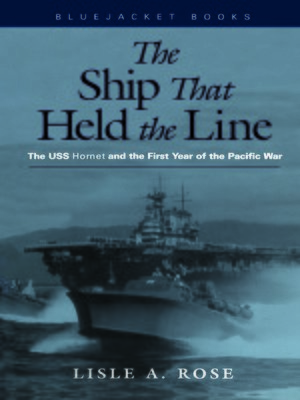The Ship that Held Line
ebook ∣ The USS Hornet and the First Year of the Pacific War · Bluejacket Books
By Lisle A Rose PhD.

Sign up to save your library
With an OverDrive account, you can save your favorite libraries for at-a-glance information about availability. Find out more about OverDrive accounts.
Find this title in Libby, the library reading app by OverDrive.



Search for a digital library with this title
Title found at these libraries:
| Library Name | Distance |
|---|---|
| Loading... |
The American fleet aircraft carrier Hornet is widely acknowledged for the contributions she made to the war effort. The Doolittle Raid, launched from the Hornet's deck, inaugurated America's Pacific counteroffensive and transformed the aircraft carrier into one of the world's prime strategic weapon systems. She was one of three carriers to participate in the victory at Midway and the fighting around Guadalcanal. Through the experiences of this key warship and the eyes of her crew and the aviators who flew from her deck, Lisle Rose recreates the first desperate year of the war in the Pacific. He tells how the Hornet was molded into a deadly weapon of war, how the ship was fought and ultimately lost, and what it was like to live aboard her at a time when the fate of the United States depended on the Navy's tiny carrier fleet. In chronicling the carrier's operational history, the author contends that the fate of the Hornet's air group at Midway remains one of the great controversies in modern naval history and that the ship's importance in helping to keep the Japanese juggernaut at bay during the most critical period of the Pacific war is incontestable. His arguments ring true today as the controversy continues. Rose succeeds both in letting the reader see things the way the men of the Hornet did and in placing their experiences in a broad historical context.







